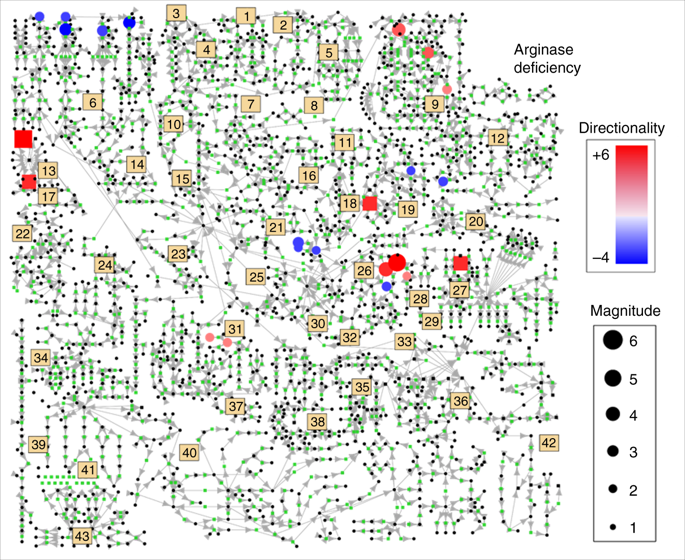当前位置:
X-MOL 学术
›
Genet. Med.
›
论文详情
Our official English website, www.x-mol.net, welcomes your
feedback! (Note: you will need to create a separate account there.)
Untargeted metabolomic profiling reveals multiple pathway perturbations and new clinical biomarkers in urea cycle disorders.
Genetics in Medicine ( IF 6.6 ) Pub Date : 2019-01-23 , DOI: 10.1038/s41436-019-0442-0 Lindsay C Burrage 1, 2 , Lillian Thistlethwaite 3 , Bridget M Stroup 1 , Qin Sun 1 , Marcus J Miller 1, 4 , Sandesh C S Nagamani 1, 2 , William Craigen 1, 2 , Fernando Scaglia 1, 2, 5 , V Reid Sutton 1, 2 , Brett Graham 1, 2, 4 , Adam D Kennedy 6, 7 , , Aleksandar Milosavljevic 1, 3 , Brendan H Lee 1, 2 , Sarah H Elsea 1
Genetics in Medicine ( IF 6.6 ) Pub Date : 2019-01-23 , DOI: 10.1038/s41436-019-0442-0 Lindsay C Burrage 1, 2 , Lillian Thistlethwaite 3 , Bridget M Stroup 1 , Qin Sun 1 , Marcus J Miller 1, 4 , Sandesh C S Nagamani 1, 2 , William Craigen 1, 2 , Fernando Scaglia 1, 2, 5 , V Reid Sutton 1, 2 , Brett Graham 1, 2, 4 , Adam D Kennedy 6, 7 , , Aleksandar Milosavljevic 1, 3 , Brendan H Lee 1, 2 , Sarah H Elsea 1
Affiliation

|
PURPOSE
Untargeted metabolomic analysis is increasingly being used in the screening and management of individuals with inborn errors of metabolism (IEM). We aimed to test whether untargeted metabolomic analysis in plasma might be useful for monitoring the disease course and management of urea cycle disorders (UCDs).
METHODS
Untargeted mass spectrometry-based metabolomic analysis was used to generate z-scores for more than 900 metabolites in plasma from 48 individuals with various UCDs. Pathway analysis was used to identify common pathways that were perturbed in each UCD.
RESULTS
Our metabolomic analysis in plasma identified multiple potentially neurotoxic metabolites of arginine in arginase deficiency and, thus, may have utility in monitoring the efficacy of treatment in arginase deficiency. In addition, we were also able to detect multiple biochemical perturbations in all UCDs that likely reflect clinical management, including metabolite alterations secondary to dietary and medication management.
CONCLUSION
In addition to utility in screening for IEM, our results suggest that untargeted metabolomic analysis in plasma may be beneficial for monitoring efficacy of clinical management and off-target effects of medications in UCDs and potentially other IEM.
中文翻译:

非靶向代谢组学分析揭示了尿素循环障碍中的多种途径扰动和新的临床生物标志物。
目的 非靶向代谢组学分析越来越多地用于筛查和管理先天性代谢错误 (IEM) 的个体。我们旨在测试血浆中的非靶向代谢组学分析是否可用于监测疾病进程和尿素循环障碍 (UCD) 的管理。方法 基于非靶向质谱的代谢组学分析用于生成来自 48 名患有各种 UCD 的个体血浆中 900 多种代谢物的 z 分数。通路分析用于识别在每个 UCD 中受到干扰的常见通路。结果 我们在血浆中的代谢组学分析确定了精氨酸在精氨酸酶缺乏症中的多种潜在的神经毒性代谢物,因此可能有助于监测精氨酸酶缺乏症的治疗效果。此外,我们还能够检测到所有 UCD 中可能反映临床管理的多种生化扰动,包括继发于饮食和药物管理的代谢物改变。结论 除了在 IEM 筛查中的实用性外,我们的结果表明,血浆中的非靶向代谢组学分析可能有助于监测 UCD 和其他潜在 IEM 中药物的临床管理效果和脱靶效应。
更新日期:2019-01-26
中文翻译:

非靶向代谢组学分析揭示了尿素循环障碍中的多种途径扰动和新的临床生物标志物。
目的 非靶向代谢组学分析越来越多地用于筛查和管理先天性代谢错误 (IEM) 的个体。我们旨在测试血浆中的非靶向代谢组学分析是否可用于监测疾病进程和尿素循环障碍 (UCD) 的管理。方法 基于非靶向质谱的代谢组学分析用于生成来自 48 名患有各种 UCD 的个体血浆中 900 多种代谢物的 z 分数。通路分析用于识别在每个 UCD 中受到干扰的常见通路。结果 我们在血浆中的代谢组学分析确定了精氨酸在精氨酸酶缺乏症中的多种潜在的神经毒性代谢物,因此可能有助于监测精氨酸酶缺乏症的治疗效果。此外,我们还能够检测到所有 UCD 中可能反映临床管理的多种生化扰动,包括继发于饮食和药物管理的代谢物改变。结论 除了在 IEM 筛查中的实用性外,我们的结果表明,血浆中的非靶向代谢组学分析可能有助于监测 UCD 和其他潜在 IEM 中药物的临床管理效果和脱靶效应。











































 京公网安备 11010802027423号
京公网安备 11010802027423号